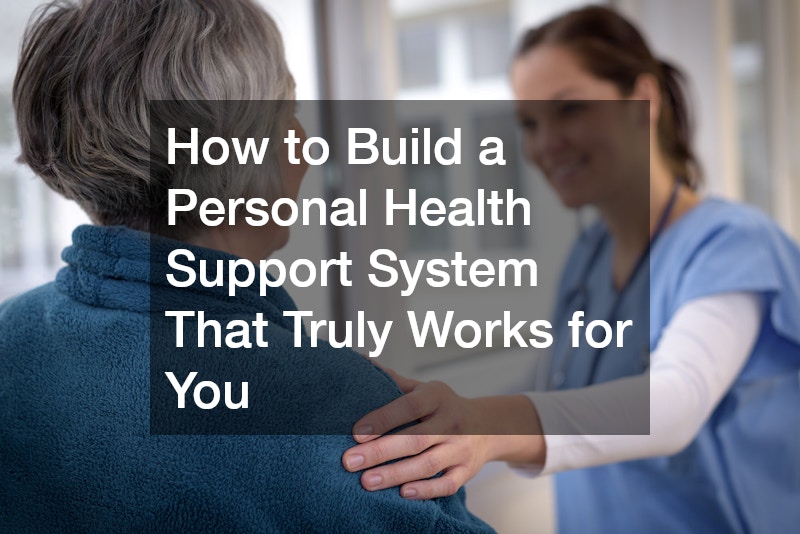
Building a personal support system that truly works for you is one of the most important and empowering steps you can take to protect your well-being throughout your life. Many people only think about their physical needs when something goes wrong, yet the most effective approach is proactive, intentional, and built long before challenges arise. A strong support system does not simply consist of a list of doctors or a few saved emergency numbers—it is a dynamic, carefully structured network of people, resources, tools, and services that help you stay well, identify issues early, make informed decisions, and receive appropriate care without delay.

Integrating Digital Care Into Your Health Strategy
Digital tools have transformed the way people approach their health, and telemedicine is now a cornerstone of any effective personal health support system. This technology allows individuals to meet with licensed professionals through secure virtual platforms, making healthcare more convenient, accessible, and efficient. telemedicine gives you the ability to receive guidance on symptoms, follow up on treatment plans, renew prescriptions, and manage chronic conditions without the time or travel constraints of traditional office visits.
To integrate telemedicine effectively, it is important to choose providers who offer reliable and secure digital services. Many clinics and hospital networks have incorporated virtual visit options into their standard care offerings, allowing you to connect with physicians, specialists, and nurse practitioners from the comfort of your home. telemedicine can be especially valuable for routine follow-ups, quick questions, behavioral health consultations, and preventive check-ins that do not require an in-person exam.
Before each virtual appointment, it helps to prepare the same way you would for an in-person visit. Keeping notes on your symptoms, organizing recent test results, and writing down any concerns allows you to use your time effectively. Ensuring that your device is charged and that your internet connection is stable also supports a smooth and productive appointment.
The true strength of telemedicine lies not only in its convenience but in its ability to enhance continuity of care. Instead of delaying a follow-up due to scheduling challenges, telemedicine allows more frequent check-ins, which leads to earlier interventions and better long-term outcomes. It also complements traditional healthcare by giving you quick access to professional guidance between in-person visits. By incorporating telemedicine into your overall health plan, you strengthen your access to timely care and create a more responsive and flexible support system that adapts to your needs.
Building Your Vision and Preventive Monitoring Team
Vision health is an essential yet often overlooked part of a comprehensive health support system. A relationship with a trusted eye care doctor provides more than updated prescriptions for glasses or contact lenses; it offers significant insight into your overall health. Many systemic conditions, including diabetes, high blood pressure, autoimmune disorders, and neurological issues, reveal early signs in the eyes long before you experience symptoms elsewhere. Because of this, maintaining regular visits with an eye care doctor contributes to both preventive care and early detection of potential health concerns.
When developing a vision care plan, it is important to schedule eye exams regularly based on your age, family history, and existing medical conditions. A complete eye examination should go beyond a basic vision check and include a detailed evaluation of the retina, optic nerve, blood vessels, and overall eye structure. An eye care doctor who offers thorough, medically focused assessments becomes a vital part of your long-term health monitoring.
Choosing the right eye care doctor is equally important. You want someone who communicates clearly, listens carefully, and explains findings in a way that supports your ability to make informed decisions. A well-rounded vision specialist will track changes in your eye health over time, alert you to early warning signs, and collaborate with your other healthcare providers when necessary.
Including vision care in your health support system strengthens your ability to maintain not only good sight but also early awareness of systemic issues. This proactive approach preserves independence, enhances daily functioning, and protects your overall health by ensuring that even subtle changes are identified and addressed promptly. Your eyes tell a detailed story about your body, and a skilled eye care doctor helps you understand and act on that story in meaningful ways.
Establishing a Healthy Weight Management Plan
Maintaining a healthy weight is a foundational component of long-term health. For many people, weight challenges cannot be solved through simple dieting or exercise routines alone. This is where a medically supervised approach becomes valuable. A medical weight loss program incorporates professional guidance, scientific assessments, and personalized planning to help individuals achieve sustainable results in a safe and structured manner.
A medical weight loss specialist will typically begin by conducting a comprehensive evaluation that may include reviewing your medical history, testing for hormonal imbalances, assessing metabolic function, and identifying lifestyle factors that interfere with weight stability. This information allows the provider to create a plan that aligns with your body’s needs rather than relying on generalized advice or restrictive trends that often fail in the long run.
Establishing a weight management plan involves creating a balance between nutrition, movement, mental well-being, and metabolic support. A medical weight loss provider may recommend nutritional adjustments, exercise routines that fit your abilities, or strategies for improving sleep and reducing stress. Some individuals may also require targeted medical interventions, depending on their health status and metabolic profile.
Consistency is key. This means preparing meals that support your goals, staying mindful of portion sizes, maintaining hydration, and finding enjoyable ways to stay active. Tracking progress, attending follow-up appointments, and adjusting your plan when needed helps ensure that your efforts contribute to long-term success rather than temporary changes.
Integrating medical weight loss into your health support system offers significant benefits. It reduces the risk of chronic conditions such as diabetes, heart disease, and joint pain. It also enhances energy, supports mental well-being, and promotes overall resilience. A structured plan grounded in medical knowledge gives you the tools to achieve healthier weight patterns and maintain them over time.

Exploring Hormonal Wellness and Long-Term Health Optimization
Hormonal balance plays a crucial role in nearly every aspect of physical and emotional health. Hormones influence metabolism, sleep quality, mood, cognitive function, reproductive health, and overall vitality. When hormonal levels decline or shift—whether due to aging, stress, medical conditions, or environmental factors—the effects can be significant. This is why incorporating hormonal wellness into your personal health support system is essential for maintaining long-term well-being.
Some individuals explore bioidentical hormone therapy as part of their approach to restoring balance. This form of therapy uses hormones that match the molecular structure of those naturally produced by the body. People may consider this option when they experience symptoms such as chronic fatigue, weight fluctuations, low libido, anxiety, sleep disturbances, or cognitive fog. However, it is important to remember that any hormonal treatment should be undertaken only with the guidance of a qualified professional.
Before considering bioidentical hormone therapy, you should undergo a comprehensive evaluation that includes lab testing and a detailed discussion of symptoms and medical history. A responsible provider will assess whether hormone therapy is appropriate, explain potential benefits and risks, and ensure that any treatment plan is personalized rather than one-size-fits-all. Regular follow-up appointments are essential, as hormone levels need to be monitored and adjusted over time.
Hormonal wellness goes beyond therapy alone. Lifestyle factors such as nutrition, exercise, sleep, and stress management play major roles in maintaining hormonal stability. Prioritizing whole foods, engaging in consistent physical activity, practicing stress-reducing techniques, and getting restorative sleep all contribute to healthier hormonal patterns.
When hormonal wellness is integrated into your overall health plan, you gain a deeper understanding of your body’s signals and needs. Addressing imbalances early helps preserve energy, cognitive sharpness, emotional stability, and long-term resilience. It is a powerful and often overlooked component of a truly comprehensive health support system.
Incorporating Preventive and Restorative Skin and Self-Care Services
Your skin serves as a protective barrier against external stressors and reflects many aspects of your internal health. Incorporating preventive and restorative skin care into your personal health support system enhances both physical well-being and emotional confidence. While daily home care is important, professional facial services can address deeper concerns and provide benefits that over-the-counter products cannot achieve.
Professional facial services promote circulation, improve lymphatic drainage, clear congestion, stimulate collagen production, and repair environmental damage. These treatments can be customized to address acne, hyperpigmentation, dehydration, sensitivity, premature aging, and other concerns that develop over time. By working with an experienced provider, you gain access to targeted techniques and advanced tools that support long-term skin health.
Choosing the right professional is essential. A qualified provider will evaluate your skin thoroughly, discuss your goals, and tailor treatments to your unique needs. They can also help you develop a consistent home routine that complements your in-office treatments. Establishing regular visits allows your provider to monitor changes in your skin and identify early signs of potential issues that may need medical attention or lifestyle adjustments.
Healthy skin contributes to overall well-being by reducing discomfort, improving self-esteem, and supporting your natural protective barrier. Changes in your skin can sometimes signal internal imbalances such as hormonal fluctuations, nutritional deficiencies, or stress-related issues. This makes professional skin assessments an important part of monitoring your wider health.
Incorporating facial services into your health support system ensures that your skin receives the care it needs to remain resilient over time. The combination of professional treatments, personalized guidance, and attentive home care creates a comprehensive approach that strengthens both physical and emotional wellness.
Understanding Your Rights and Legal Protections in Healthcare
Understanding your rights as a patient is a fundamental part of maintaining control over your health. Even with a well-structured support system, mistakes or negligence can occur within healthcare environments. When this happens, knowing when to consult a medical malpractice attorney is essential to protecting your well-being and ensuring accountability.
A medical malpractice attorney specializes in cases where a provider may have failed to uphold the expected standard of medical care. This can involve surgical errors, misdiagnoses, poor communication, medication mistakes, failures to follow up, or lack of informed consent. Although not every negative outcome is the result of malpractice, situations where negligence leads to significant harm deserve careful evaluation by a legal professional.
Preparing for potential legal concerns begins with keeping thorough and organized medical records. Documenting symptoms, treatment plans, communication with providers, medication changes, and test results creates a clear timeline of your care. Requesting copies of imaging scans, lab work, and physician notes ensures you have direct access to essential information. Staying informed about your treatment options, asking questions, and seeking second opinions when uncertain helps you remain an active participant in your healthcare.
If you ever suspect that an error has harmed your health, a medical malpractice attorney can assess your situation, determine whether negligence occurred, and explain your options. This guidance can help you pursue compensation for medical expenses, ongoing treatment, or long-term care if necessary.

Preparing for Unexpected Health Situations
Health issues can arise without warning, and being prepared for these unexpected situations ensures that you can respond quickly and confidently. Incorporating urgent care into your personal health support system provides a practical and accessible option for addressing non-life-threatening conditions that require prompt attention. urgent care facilities act as an essential bridge between routine checkups and emergency services, giving you immediate access to professional care when time matters.
People rely on urgent care centers for a wide range of issues, including minor injuries, infections, fever, respiratory problems, sprains, and sudden discomfort that does not require emergency hospital intervention. These centers often offer diagnostic services such as X-rays, blood tests, and rapid screenings, allowing for quick evaluation and treatment. By knowing which urgent care locations are near your home, workplace, or frequently visited areas, you can reduce stress during unexpected health events.
Building urgent care into your health support system begins with identifying reputable facilities in your area. It helps to be familiar with their operating hours, the services they offer, and whether they accept your insurance. Creating an easily accessible list of urgent care locations and contact information—stored in your phone or health binder—ensures that you can take immediate action when symptoms arise.
Having access to urgent care prevents unnecessary delays in treatment and reduces the risk of complications. Early evaluation of symptoms such as severe sore throats, persistent coughs, minor injuries, or infections can prevent more serious health challenges down the road. By including urgent care in your support system, you strengthen your ability to stay proactive and responsive whenever unexpected issues occur.
Knowing When Higher-Level Treatment Is Needed
While urgent care centers handle many immediate needs, certain health situations require more advanced and time-sensitive treatment. Recognizing when to go to an emergency hospital is a critical part of protecting your health and ensuring quick access to life-saving interventions. An emergency hospital is equipped to treat severe conditions such as chest pain, breathing difficulties, major trauma, stroke symptoms, high-risk infections, sudden neurological changes, and other acute medical emergencies.
Understanding the signs of a true emergency is essential. Severe chest discomfort, sudden weakness on one side of the body, intense abdominal pain, uncontrolled bleeding, difficulty breathing, and sudden confusion are all reasons to seek immediate emergency hospital care. When you know the difference between urgent and emergent situations, you can act decisively during high-stress moments.
Preparing this part of your health support system begins with identifying the emergency hospital closest to your home and workplace. It is helpful to understand which facilities have strong trauma ratings, specialized units, or comprehensive cardiac or neurological services, depending on your risk factors or medical history. Planning travel routes in advance, including alternate routes, can also reduce delays during critical moments.
Creating an emergency information kit that includes medical history, medication lists, allergies, insurance details, identification, and contact information strengthens your readiness. Sharing this information with family members or trusted caregivers ensures that everyone knows how to respond if immediate action is required.
Building and Maintaining Your Routine Care Providers
Routine care providers form the foundation of your long-term health support system, and dental care is one of the most essential components of this foundation. Oral health is directly connected to overall health, influencing the immune system, heart health, digestion, and even respiratory function. Neglecting dental health can allow small problems to become major complications, making regular dental care vital to preventing disease and maintaining well-being.
Establishing a relationship with a trusted provider involves scheduling routine checkups and cleanings, typically every six months unless your provider recommends a different frequency based on your needs. During these visits, your dentist evaluates your teeth, gums, and oral tissues to identify early signs of decay, infection, inflammation, or more serious conditions like oral cancer. This type of preventive monitoring protects long-term health by catching issues early.
Choosing the right provider means finding someone who communicates clearly, uses modern diagnostic tools, explains treatment options thoroughly, and prioritizes patient comfort. The more open and collaborative the relationship, the more effectively your dental care contributes to your broader health goals.
Day-to-day practices are also essential. Maintaining a consistent oral hygiene routine, limiting sugary foods, staying hydrated, managing stress, and addressing concerns such as grinding or sensitivity all play important roles. When combined with professional care, these habits create a strong foundation for lifelong oral and systemic health.

Planning for Long-Term Comfort and Compassionate End-of-Life Support
Preparing for long-term comfort and end-of-life support is a deeply compassionate step that strengthens your overall health support system. Although these conversations can be emotionally challenging, they are essential for ensuring dignity, peace, and choice during later stages of health. hospice care at home is a valuable option that allows individuals with terminal illnesses to remain in familiar surroundings while receiving expert medical, emotional, and practical support.
Hospice care at home prioritizes comfort rather than curative treatment. It focuses on managing symptoms, alleviating pain, and supporting emotional well-being for both patients and families. Being cared for at home allows individuals to maintain a sense of independence and personal connection while benefiting from the expertise of trained hospice professionals.
To incorporate hospice care at home into your long-term planning, it is important to understand eligibility requirements and available services. Hospice typically requires a physician’s certification that an individual has a terminal illness with a limited life expectancy. Early discussions with family members and healthcare providers ensure that everyone understands personal wishes regarding comfort, interventions, and support.
Choosing the right hospice provider is an important part of the process. Reputable hospice teams offer skilled nursing care, pain and symptom management, emotional and spiritual counseling, medication coordination, respite support for family caregivers, and guidance through end-of-life decisions. Preparing the home environment by organizing space for necessary equipment and ensuring comfortable living arrangements helps support both the patient and the caregiving team. Including hospice care at home in your health support system provides clarity and reassurance during a vulnerable stage of life. It ensures that individuals receive compassionate, respectful care while families receive guidance, support, and peace of mind.
Building a personal health support system that truly works for you is a long-term commitment to your well-being. It involves thoughtful planning, informed decision-making, and continuous evaluation of the services and professionals who support your needs. By developing a system that evolves with you, you create a strong foundation that protects your health, enhances your resilience, and empowers you throughout every stage of life.

